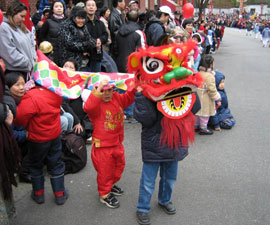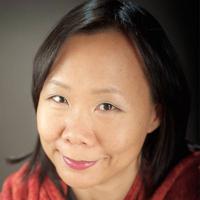
When I was growing up, my parents didn't do very much for Chinese New Year. Born in Hong Kong, they were also Westernized professionals who had studied and worked in Scotland. After we left Scotland for Vancouver when I was four, my mother would mention celebrating Robbie Burns day more frequently than she did Chinese New Year.
My siblings and I heard and spoke English at home and ate Western food most of the time. But once a year, we received yearly laisee, lucky money from relatives and parents, and the family would gather for a special banquet in a restaurant. Other than that, we didn't practice many of the rituals that I subsequently learned about -- all the cleaning, buying of new clothes, visiting relatives, cooking and eating all the special symbolic foods with names that were homonyms, for things like long life (fish, yu), good events (dried oysters, ho see), prosperity (a type of hair-like black moss, fat choy), or gold (tangerine, gum).
When I became an adult, I'd have the usual annual supper with my family and sometimes I would organize a group of non-Chinese friends to join me for supper at a local Chinese eatery. But it wasn't until I had a child of my own that the holiday became more deeply meaningful, the way having a kid around at Christmas or Chanukah transforms those holidays into something magical.
A noisy, diverse party
Coming from a family with few superstitions or rituals, I educated myself by reading up about the holiday. I went to my first Chinese New Year multicultural parade in Chinatown, hoisting my son on my shoulders. We heard the firecrackers go off amid the clang of the cymbals and pounding of the drums as kung fu troupes with their lions and dragons wound down Pender Street, interspersed with marching war veterans, bagpipers and prancing Bhangra dancers.
For my son's kindergarten and Grade 1 French immersion classes, I was asked to do a presentation for the students for Chinese New Year. Each time, I struggled in my rusty high-school-level French to remember the names of the Chinese zodiac animals and to explain Chinese rituals I hadn't practiced growing up ("On porte de nouveaux vetements et les grandparents donnent les envelopes rouges aux enfants...."). I handed out tangerines and stuffed red envelopes with pairs of pennies, even simulated a diluted version of a lion dance with a mask I'd bought.
Last year, I hosted a Chinese New Year tea for some friends and neighbours, puzzling through what I could serve that would be kosher, vegetarian, MSG-free, and non-deep fried to celebrate a cultural holiday where pork, shellfish and crispy golden fried snacks hold sway. My guests drank the Chinese tea, ate the homemade almond cookies and smoked salmon (the compromise, instead of the customary whole fish with head still attached). Few except me touched the authentic but gooey sweet glutinous rice cake.
Feeling like an imposter
Being appointed a kind of cultural ambassador was never something I'd anticipated. I am not entirely comfortable representing anyone other than myself, and as I can't speak Chinese, I often feel like an imposter. And when people sometimes use the term "the Chinese Community," I feel uneasy, as there is no monolithic cohesive entity. Chinese-Canadians are, of course, as diverse as any other Canadian community, shaped by the time of arrival in Canada, social class, geographic origins, religion, political leanings, employment and education, among a myriad other aspects.
I remember a job where I was hired to provide staff support to a multiculturalism committee. My background was in anti-racism and human rights, not in anthropology or languages, yet I seemed to be expected to be a source of knowledge about all other cultures.
Mazel tov!
These experiences have led me to ponder once again the complex relationship between race and culture -- about what is actually intrinsic and what is imposed as cultural expectation both from within various local Chinese communities and from the larger community: I'm expected to speak Chinese, expected to have been raised to possess a knowledge of cultural customs and rituals, and expected to educate other people about them. But what if I know just as much about other cultures and customs? Or if I know little more than anyone else?
This school year, I decided on the spur of the moment to be just slightly subversive. As no one in my son's class this year was Jewish, I volunteered to read a French book on Chanukah and also bring frozen latkes and a few dreidels, which my son taught the other students to play. When requested to play Christmas carols on the piano in the school entrance hall one morning last December, I threw in "I have a little dreidel." I have not a single drop of Jewish blood, have no Jewish affiliations other than friendships, but I figured why not, if the promotion of cultural diversity was the school's goal, and if greater familiarity breeds greater social harmony.
Pass the dumplings
Notwithstanding the expectations and needs of the outside world, however, there is one thing that remains key to the celebration of Chinese New Year: being with family. During the last weeks of my mother's life when she was unconscious in the palliative care ward of Vancouver General Hospital, my siblings brought over Chinese food from the restaurant that our mother had taken us to regularly for years while we were growing up. It was important to celebrate the holiday together with her that last time, although she obviously couldn't eat. My siblings and I remembered those days our tired mom would come home from a hard day of work and whisk us off to The Snow Garden, where we'd devour our favourite dishes and come home satisfied.
It borders on cliché to say, but eating together (just as with Christmas, Rosh Hashanah, Ramadan, weddings, funerals and other like holidays) -- and in particular, feasting together -- has real significance, representing a deep human need for community and ritual. And now that I have a child, it's even more important to foster those bonds, to give him a sense of connection and continuity with the past as well as the present.
This Chinese New Year, we'll be having hotpot and homemade potsticker dumplings with my siblings and their families, sitting around the table over a simmering pot of broth, chatting and laughing, and most of all feeling thankful for all the good things we have -- food, shelter, health and each other. ![]()















Tyee Commenting Guidelines
Comments that violate guidelines risk being deleted, and violations may result in a temporary or permanent user ban. Maintain the spirit of good conversation to stay in the discussion.
*Please note The Tyee is not a forum for spreading misinformation about COVID-19, denying its existence or minimizing its risk to public health.
Do:
Do not: